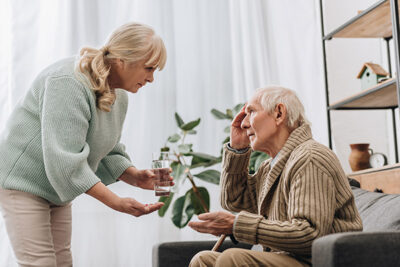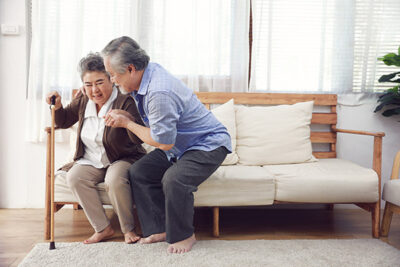Older adults can enjoy active, fulfilling, and pleasurable sex live as they move through their 50s, 60s, 70s and beyond. Aging does not mean that the desire for sex goes away, and nor should it mean that you stop finding pleasure in sex or masturbation, if you want to!
 However, as you age, changes to relationships, family, health, living situation, bodies, work life, and social networks can impact your physical and mental health. In turn, these changes can profoundly impact your sex life and sexual wellbeing.
However, as you age, changes to relationships, family, health, living situation, bodies, work life, and social networks can impact your physical and mental health. In turn, these changes can profoundly impact your sex life and sexual wellbeing.
We’ve chatted to over 1,000 people over 45 about sex. Some of the common things they brought up as factors impacting their sex lives are below- along with some advice about how to overcome them!
 In the UK, around 40 per cent of long-term relationships break down. The peak age range for relationship breakdown is between 45 and 55, with relationships of between 25 and 35 years most at risk.
In the UK, around 40 per cent of long-term relationships break down. The peak age range for relationship breakdown is between 45 and 55, with relationships of between 25 and 35 years most at risk.
Relationships end for several reasons, with money management, mental health, infidelity, lack of sex, addiction, and abuse being some of the most common reasons. More generally, couples often report ‘drifting apart’ or ‘falling out of love’, especially when quality time with their partner is lost among the demands of older children, career pressures, mental health, financial concerns, caring responsibilities, or physical health issues.
Intimacy and sex often take a back seat to other priorities, which can be both the cause and effect of other issues within relationships.
The COVID-19 pandemic caused a spike in break-ups and divorces, with some studies showing as high as a 122 per cent increase at peak pandemic times. Long covid and continued changes to lifestyles, such as working from home, continue to have an impact.
It is very common for people to experience loss of sexual confidence, satisfaction, or libido when a long-term relationship breaks down. Unsurprisingly, studies show that psychological distress increases following the breakdown of a relationship, as well as a decline in overall wellbeing. Many people also experience a reduced quality of life and lifestyle, as incomes are divided. One partner often ends up financially worse off than another partner following a breakup, which can lead to greater distress and mental health issues. Research shows that women tend to be worse off than men when heterosexual relationships break down; data on outcomes following the breakdown of same-sex relationships is harder to find.
If your relationship has broken down, and you need some support, consider seeing your GP to chat about options for counselling, or finding your own counsellor privately. Getting out and interacting with family and friends, taking up a new hobby or re-examining an old interest, and living an active lifestyle can also help. If your feelings of anxiety or depression are significant or last a long time, do see your GP.
 The challenges of new relationships, both the building of intimacy bonds and negotiating sex, can be daunting, particularly for individuals who had previously been with the same partner for many years before.
The challenges of new relationships, both the building of intimacy bonds and negotiating sex, can be daunting, particularly for individuals who had previously been with the same partner for many years before.
Confidence in older bodies that may feel affected by pregnancy and childbirth, or changed by illness, accident or surgery can prove difficult, as can feeling relaxed and enjoying sexual contact with a new partner.
New ways of dating and meeting potential partners, for example through apps or on social media, can be scary for older people who might not have experienced it before. This can lead to people becoming isolated. If you want to date but don’t feel comfortable online (there are specific dating sites for older people), you might consider getting involved in a hobby or activity, or even attending a speed dating evening or in-person dating event. There will also be loads of local activities available to you, in your area- have a look around, and when you’re ready to start dating again, make sure you stay safe!
If you have met a new sexual partner or partners, you should get a check-up for sexually transmitted infections (STIs), regardless of your age. Getting an STI check is your choice and getting one will save you wondering and worrying if everything is okay, and any infections that are found can be managed.
STI testing is free of charge via the NHS. If you are in the UK, visit NHS.uk/service-search/find-a-sexual-health-clinic/ to find your local testing clinic. Many areas will provide free online testing, whereby a sexual health screen will be sent to your home for you to complete and send off by yourself. Other areas still require you to visit a sexual health clinic in person. In the UK, sexual health checks are free on the NHS.
 Retirement of one or both partners can also place a burden on relationships and sexuality, with role changes and an increase in time spent at home with a partner often increasing pressure on a relationship. Many people experience a decline in physical or mental health following retirement, particularly when time spent working is not replaced with time spent on other hobbies or interests. Other common issues, like boredom with your partner, alcohol or substance misuse, lack of energy or health, and physical health issues can all play a role in impacting your sex life, either with yourself or with a partner, as you are retired.
Retirement of one or both partners can also place a burden on relationships and sexuality, with role changes and an increase in time spent at home with a partner often increasing pressure on a relationship. Many people experience a decline in physical or mental health following retirement, particularly when time spent working is not replaced with time spent on other hobbies or interests. Other common issues, like boredom with your partner, alcohol or substance misuse, lack of energy or health, and physical health issues can all play a role in impacting your sex life, either with yourself or with a partner, as you are retired.
As ever, communication and good healthcare support are vital. If you have a partner, talk to them about what you’d like to get from your intimate relationship throughout your retirement. If health issues are preventing one or both of you from being able to have sex at all, or being able to enjoy sex, don’t be embarrassed or ashamed to seek help from your GP or other healthcare provider.
Many, many people report having a fulfilling sex life throughout retirement, with over 50 per cent of people having sex more than once per month. More than 90 per cent of people who are retired report having regular thoughts and desires about sex. Even though sex and pleasure might change somewhat as you age, it can absolutely be found- sometimes, it will come naturally, and other times, you might need a bit of extra support.
 Caring responsibilities can be physically and mentally draining, and can increase levels of stress, depression, and anxiety, and can decrease time spent on self-care, exercise, and relaxing.
Caring responsibilities can be physically and mentally draining, and can increase levels of stress, depression, and anxiety, and can decrease time spent on self-care, exercise, and relaxing.
It is very common for people aged 45 to 65 to take on caring responsibilities for parents or older family members, which can place a burden on time, relationships, finances, and health. At the same time, many people in this age group also have teenage children. The so-called “sandwich generation” then has the double-stress of caring for both parents and children simultaneously, whether financially, physically, and/or emotionally. Some also care for grandchildren at the same time. Add this to the impact of COVID-19, the global recession, the cost-of-living crisis, and many adult children moving home due to housing issues, and you have a recipe for high levels of stress and low levels of self-care.
Caregiving can take many forms:
- Emotional: Support as the person copes with appointments, uncertainty about test results, the future, and symptoms of the illness.
- Physical: hands-on assistance with bathing, dressing, transferring, walking, feeding, managing bowel and bladder functions and more.
- Cognitive: planning activities and meals, managing finances, organizing appointments, meeting with physicians and other providers, and advance care planning.
Caring can be physically and mentally exhausting and can leave little time or desire for sex. Carers often set aside their own need for sex, even though they are still sexual beings. Equally, acute priorities often mean that romantic relationships are neglected, which can lead to relationship tensions and breakdown.
Things that can help:
- Joining a carer’s support group
- Self-care: fitness, yoga, meditation, baths, music- whatever works for you
- Maintaining touch with your partner
- Communication with your partner about each of your needs and expectations
- Starting couples’ counselling
- Setting time aside to focus solely on your relationship
- Masturbation, potentially with the addition of sex toys
- Talking: to your partner, to a healthcare provider, to a counsellor, to other carers, or to friends and family
- Seeking Support via: GP, adult social services, charities, healthcare practitioners, assisted living facilities
Look into a carer’s allowance: Carersuk.org/help-and-advice/financial-support/help-with-benefits/carers-allowance
 It is easy to overlook the “other” type of caring, which is when one partner in a couple adopts a caring role within the relationship due to arising physical or cognitive health issues.
It is easy to overlook the “other” type of caring, which is when one partner in a couple adopts a caring role within the relationship due to arising physical or cognitive health issues.
Caregiving can take many forms:
- Emotional: Support as the person copes with appointments, uncertainty about test results, the future, and symptoms of the illness.
- Physical: hands-on assistance with bathing, dressing, transferring, walking, feeding, managing bowel and bladder functions and more.
- Cognitive: planning activities and meals, managing finances, organizing appointments, meeting with physicians and other providers, and advance care planning.
Caring can be physically and mentally exhausting and can leave little time or desire for sex. Carers often set aside their own need for sex, even though they are still sexual beings.
It can also be difficult for both caregivers and care-receivers to navigate the change from a sexual relationship to a carer-caree relationship. Roles can reverse, dynamics can change, and both partners can experience resentment, anger, and frustration as well as social isolation. Grief can also play a role, particularly when dementia is involved, or when similarly aged friends and family start to pass away.
Things that can help:
- Joining a carer’s support group
- Self-care: fitness, yoga, meditation, baths, music- whatever works for you
- Maintaining touch with your partner
- Masturbation, potentially with the addition of sex toys
- Exploring other options, such as an open relationship, erotic books or films, or sex toys
- Talking: to your partner, to a healthcare provider, to a counsellor, to other carers, or to friends and family
- Seeking Support via: GP, adult social services, charities, healthcare practitioners, assisted living facilities
- Look into a carer’s allowance: Carersuk.org/help-and-advice/financial-support/help-with-benefits/carers-allowance
 Romantic and sexual relationships are a huge part of living in a care home for many people, even though support for expressions of sexuality amongst the elderly is often underwhelming. According to carehome.co.uk, the Royal College of Nursing (RCN) and the Care Quality Commission (CQC) in the UK are asking care home to be more proactive when it comes to meeting the sexual health needs of their residents.
Romantic and sexual relationships are a huge part of living in a care home for many people, even though support for expressions of sexuality amongst the elderly is often underwhelming. According to carehome.co.uk, the Royal College of Nursing (RCN) and the Care Quality Commission (CQC) in the UK are asking care home to be more proactive when it comes to meeting the sexual health needs of their residents.
There are lots of factors that can make sexual expression difficult in care homes, including:
- Lack of privacy
- Staff entering rooms without knocking
- Lack of appropriate-sized beds or rooms designed for sharing
- Concerns about ability to consent, particularly when cognitive decline is present
- Homophobic, bi-phobic, and transphobic views, held by staff and other residents
- Judgement around having or using sex toys, erotic films, or erotic books
- Families not approving of their cared-for relative having sex or masturbating
If you or your loved one is considering moving into a home, you may want to ask:
- Do you have an intimate relationships policy
- Do you allow sex workers on site
- Do you offer double or king-sized beds
- Have your staff had any sexual health awareness training
- Do your care plans include the right to privacy and dignity
- What is your protocol around closed doors?
- Where could your residents seek support to order sex toys or pornography
- How do you apply the principles of individual autonomy and consent to patients with dementia
- How much sexual orientation and gender identity expression do you see
- What is your policy around homophobic, bi-phobic, and transphobic bullying
- Do your staff and residents receive LGBTQ awareness training.
